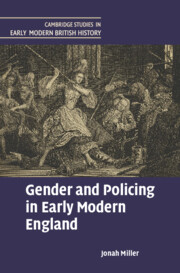Book contents
- Gender and Policing in Early Modern England
- Cambridge Studies in Early Modern British History
- Gender and Policing in Early Modern England
- Copyright page
- Dedication
- Contents
- Tables
- Acknowledgements
- Abbreviations and Conventions
- Introduction
- Part I Patriarchy
- Part II Remaking Office
- 2 The Law of Office
- 3 Office and Manhood
- Part III Policing
- Conclusion
- Book part
- Select Bibliography
- Index
2 - The Law of Office
from Part II - Remaking Office
Published online by Cambridge University Press: 07 June 2023
- Gender and Policing in Early Modern England
- Cambridge Studies in Early Modern British History
- Gender and Policing in Early Modern England
- Copyright page
- Dedication
- Contents
- Tables
- Acknowledgements
- Abbreviations and Conventions
- Introduction
- Part I Patriarchy
- Part II Remaking Office
- 2 The Law of Office
- 3 Office and Manhood
- Part III Policing
- Conclusion
- Book part
- Select Bibliography
- Index
Summary
This chapter shows how the ties between office and household were loosened from the early seventeenth century by a new legal approach to officeholding. The authority of certain officers began to be treated as separable from their personal identity, meaning they no longer had to be ‘independent’ heads of household. MPs passed statutes to protect officers from lawsuits, providing they acted in accordance with the authority granted to them by higher powers. Judges developed a distinction between ‘judicial’ and ‘ministerial’ officers: the first required personal qualities associated with independence, the second did not. ‘Ministerial’ officers wielded an impersonal form of authority which had nothing to do with their individual identities. In interactions with other people, they conjured this authority with an array of special words and props, which granted them legal protection as servants of the state. This was especially clear in homicide law, where the question of whether or not an officer had properly conjured authority could determine the outcome of a trial. The impersonal model of official authority laid the foundations for a new style of masculine officeholding.
- Type
- Chapter
- Information
- Gender and Policing in Early Modern England , pp. 61 - 102Publisher: Cambridge University PressPrint publication year: 2023



